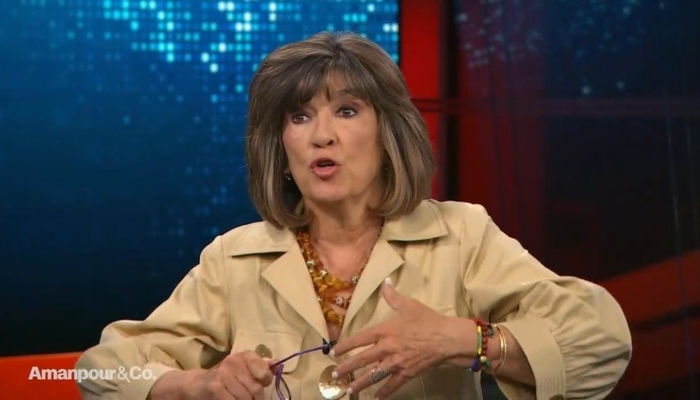


On Wednesday, PBS’s Amanpour & Company featured eponymous host Christiane Amanpour interviewing and lamenting to Vanuatu Minister for Climate Change Ralph Regenvanu that rich countries will ignore the United Nations's International Court of Justice ruling that rich countries must pay reparations to poor countries over climate change.
The catalyst behind the ICJ’s ruling came from the origin of groups like the Pacific Islands Students Fighting Climate Change and Worlds Youth for Clime Justice. Vanuatu happily took up their cause.
Amanpour voiced her displeasure over countries such as the “new U.S. Administration” and E.U. not acting over the United Nations reparations:
Can I ask you just to be very, very realistic? Because you can see that certainly with the new U.S. administration, even the E.U., all these nations and blocs that have talked a lot about, you know, growing back green and really taking care of the climate and doing what they can seem to be on the retreat right now. There are other financial issues, the U.S., for itself, has pulled out of all sorts of climate and multilateral accords and rolled back the clock on institutions around the climate and environment in its own country. “On the retreat” looks like well-established countries pouring money into their own countries to help them flourish before giving money to other countries based on rulings from radical foreign courts.
Regenvanu added to the “pressure” for countries to participate in climate reparations:
And this particular decision today gives a lot of hope to the youth because they're the ones who pushed for this advisory opinion and the fact that it's been so strong in their favor will galvanize them as well as wider civil society to put much more pressure on governments to take real action in the face of a reality of increasing devastation caused by climate change for every country. So, the reality will force countries to come to accept what this advisory opinion has just said.
Here’s another reality check: giving money to these countries for climate change will not help the ocean to rescind or cause temperatures to fall. Meanwhile, U.S. carbon emissions have been on the decline since 2000, regardless of who the president has been. Someone tell the climate activists at the UN and PBS.
Click here for the transcripts:
PBS’s Amanpour & Company
7/24/25
1:43 a.m. Eastern
CHRISTIANE AMANPOUR: Can I ask you just to be very, very realistic? Because you can see that certainly with the new U.S. administration, even the E.U., all these nations and blocs that have talked a lot about, you know, growing back green and really taking care of the climate and doing what they can seem to be on the retreat right now. There are other financial issues, the U.S., for itself, has pulled out of all sorts of climate and multilateral accords and rolled back the clock on institutions around the climate and environment in its own country.
So, where do you see the hope coming from, even by using this law? Because it seems to be a major crisis point right now.
RALPH REGENVANU: Well, the reality is that climate change affects everybody. And increasingly, we will see this happen all across the world. And a good example is in the last decade, it's the first time ever, the last 10 years, have been the hottest years. Each one on record ever. And the last one has been the hottest ever. And we are seeing everything happening in -- all over the world.
We're seeing what happened here in The Hague is a result of a global youth movement for climate justice. And this particular decision today gives a lot of hope to the youth because they're the ones who pushed for this advisory opinion and the fact that it's been so strong in their favor will galvanize them as well as wider civil society to put much more pressure on governments to take real action in the face of a reality of increasing devastation caused by climate change for every country. So, the reality will force countries to come to accept what this advisory opinion has just said.
AMANPOUR: Can I just dig deeper into the youth movement that you described? Because, essentially, this case has apparently been about six years in the making. It was first brought to you by, as you say, a group of 27 students from the University of the South Pacific. This was back in 2019.
How does that work? What did they say? How did they petition? What had they done to make -- you know, to reach this judgment today?
REGENVANU: So, they came with this idea that the single -- they were law students. The single best legal remedy to the climate crisis was to get an advisory agreement through ICJ. So, it was this pie in the sky idea. They came to see Vanuatu. We agreed to take it up and push it up to the international level. And then this whole global movement, the Global Climate Justice Youth Network developed, advocating in all their different countries with their governments to support it.
And what happened last year in the General Assembly of the United Nations was that unanimously the entire -- every country in the world agreed to refer this question to the ICJ. And that was historic.That was the first time that the General Assembly has unanimously referred a question to the ICJ. It's never happened before in history. And then, today, we also saw the advisory opinion being handed out also unanimously, and that's very rare for the ICJ also.
